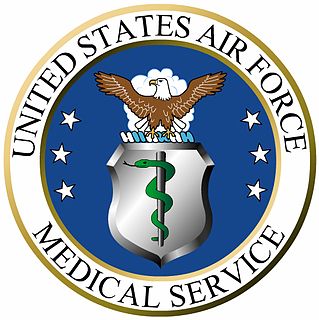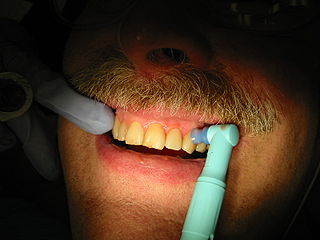An antianginal is any drug used in the treatment of angina pectoris, a symptom of ischaemic heart disease.

Infective endocarditis is an infection of the inner surface of the heart, usually the valves. Symptoms may include fever, small areas of bleeding into the skin, heart murmur, feeling tired, and low red blood cell count. Complications may include valvular insufficiency, heart failure, stroke, and kidney failure.
Post-exposure prophylaxis, also known as post-exposure prevention (PEP), is any preventive medical treatment started after exposure to a pathogen in order to prevent the infection from occurring.

A dental hygienist or oral hygienist is a licensed dental professional, registered with a dental association or regulatory body within their country of practice. Prior to completing clinical and written board examinations, registered dental hygienists must have either an Associate's or Bachelor's degree in Dental Hygiene from an accredited college or university. Once registered, hygienists are primary healthcare professionals who work independently of or alongside dentists and other dental professionals to provide full oral health care. They have the training and education that focus on and specialize in the prevention and treatment of many oral diseases.
Antibiotic prophylaxis refers to, for humans, the prevention of infection complications using antimicrobial therapy. Antibiotic prophylaxis in domestic animal feed mixes has been employed in America since at least 1970.

A dental drill or handpiece is a hand-held, mechanical instrument used to perform a variety of common dental procedures, including removing decay, polishing fillings, and altering prostheses.
The handpiece itself consists of internal mechanical components which initiate a rotational force and provide power to the cutting instrument, usually a dental burr. The type of apparatus used clinically will vary depending on the required function dictated by the dental procedure. It is common for a light source and cooling water-spray system to also be incorporated into certain handpieces; this improves visibility, accuracy and overall success of the procedure.

The United States Air Force Medical Service (AFMS) consists of the five distinct medical corps of the Air Force and enlisted medical technicians. The AFMS was created in 1949 after the newly independent Air Force’s first Surgeon General, Maj. General Malcolm C. Grow (1887–1960), convinced the United States Army and President Harry S. Truman that the Air Force needed its own medical service.
Dental insurance is a form of health insurance designed to pay a portion of the costs associated with dental care. There are several different types of individual, family, or group dental insurance plans grouped into three primary categories: Indemnity, Preferred Provider Network (PPO), and Dental Health Managed Organizations (DHMO).
The Surgical Care Improvement Project (SCIP) partnership is an American multi-year national campaign to substantially reduce surgical mortality and morbidity through collaborative efforts between healthcare organizations. The campaign began in August 2005 with the original goal of reducing the national incidence of surgical complications by 25% by the year 2010.

Phenoxymethylpenicillin, also known as penicillin V and penicillin VK, is an antibiotic useful for the treatment of a number of bacterial infections. Specifically it is used for the treatment of strep throat, otitis media, and cellulitis. It is also used to prevent rheumatic fever and to prevent infections following removal of the spleen. It is given by mouth.
Mogens Schou was a Danish psychiatrist whose research into lithium led to its utilization as a treatment for bipolar disorder.

Tooth polishing is done to smooth the surfaces of teeth and restorations. The purpose of polishing is to remove extrinsic stains, remove dental plaque accumulation, increase aesthetics and to reduce corrosion of metallic restorations. Tooth polishing has little therapeutic value and is usually done as a cosmetic procedure after debridement and before fluoride application. Common practice is to use a prophy cup—a small motorized rubber cup—along with an abrasive polishing compound.
An antiviral stockpile is a reserve supply of essential antiviral medications in case of shortage. Many countries have chosen to stockpile antiviral medications against pandemic influenza. Because of the time required to prepare and distribute an influenza vaccine, these stockpiles are the only medical defense against widespread infection for the first six months. The stockpiles may be in the form of capsules or simply as the active pharmaceutical ingredient, which is stored in sealed drums and, when needed, dissolved in water to make a bitter-tasting, clear liquid.
Sulfadoxine/pyrimethamine, sold under the brandname Fansidar, is a combination medication used to treat malaria. It contains sulfadoxine and pyrimethamine. For the treatment of malaria it is typically used along with other antimalarial medication such as artesunate.
R-HDAC, or R-HD-AraC is a chemotherapy regimen that is used, alternating with R-Maxi-CHOP, as part of so-called "Nordic protocol" of treating mantle cell lymphoma. It consists of monoclonal antibody rituximab and high-dose antimetabolite cytarabine.
World Oral Health Day is observed annually on 20 March, and launches a year-long campaign dedicated to raising global awareness of the issues around oral health and the importance of oral hygiene so that governments, health associations and the general public can work together to achieve healthier mouths and happier lives. Of the world's population, 90% will suffer from oral diseases in their lifetime, many avoidable. Organized by FDI World Dental Federation, World Oral Health Day involves campaigns by national dental associations from around the world with activities in over 130 countries, not leaving out the Nigerian Dental Association (NDA) and the National Association Of Dental Students (NADS) of Nigeria..
There are many circumstances during dental treatment where antibiotics are prescribed by dentists to prevent further infection. The most common antibiotic prescribed by dental practitioners is penicillin in the form of amoxicillin, however many patients are hypersensitive to this particular antibiotic. Therefore, in the cases of allergies, erythromycin is used instead.

Flumedroxone acetate, sold under the brand names Demigran and Leomigran, is a progestogen medication which is or has been used as an antimigraine agent. It is taken by mouth.







